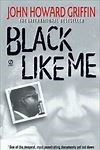 Black Like Me, by John Howard Griffin
Black Like Me, by John Howard Griffin
Many have heard of this book and many have not. I was among the latter. But I want to expand my knowledge about race in America and this book soared to the top of my reading pile.
Published in 1961, Black Like Me is the story of author John Howard Griffin’s journey as he transformed from a middle class intellectual white man to an unemployed, wandering black man. Using medication to darken his skin, Griffin spent six weeks passing as black in Louisiana and Mississippi in 1959. Not surprisingly, he learned some hard, foul truths about race, prejudice and bigotry in these United States of America.
As a black man, he ceased to be judged by white people for his accomplishments. He was no longer an erudite white man but a stereotyped “negro.” Yet, while his white brethren despised him because of his skin, he was accepted into the black community without question. He was given shelter, food, friendship and solid advice.
A few years ago, I attended a dinner of union organizers and labor officials in Washington, D.C. I was the only white person at my end of the long table. My fellow diners asked me about my background, and I told them I’d been married to a black man and had two bi-racial sons. With that revelation, it was like a dam broke and I was given one of the greatest gifts of my life—an impromptu insight into the lives of black Americans.
Each person told me a story that illustrated how prejudice had affected their lives. A strong middle-aged woman said she would not drive through Mississippi on her way to Louisiana in the dark. “If night starts to fall,” she said, “I find somewhere to stop near the border in Tennessee and then start out again at first light. I simply won’t drive in Mississippi in the dark.”
“Even though you’re black?” I asked.
“Especially because I’m black,” she said. Of course, I thought. “What a stupid question to ask. Forgive me.”
“But it’s not stupid,” she assured me. “That’s why I’m telling you about it. White people just don’t know. How can they?”
A young man told me about driving across the country in a white Cadillac convertible with two white women.
“What? Were you trying to get yourself killed?” asked the man sitting next to him.
No, he said, he just wanted to have an adventure with two friends who happened to be white women. They were stopped by police nearly everywhere they drove, spending several nights in jail in South Dakota for no other reason than their skin color. Police tried to charge him with kidnapping or pimping or drug dealing. After all, for what other reason would a black man, driving a white Cadillac with two white woman, be doing if not something criminal?
Recently, I attended a memorial service and march for the nine black people shot by a white man at church in Charleston, South Carolina. I spoke with a young woman who had given a moving speech to the audience.
“What can I do?” I asked her, feeling stupid and useless and inadequate.
“Look at what you’ve done,” she said. “Look at each and every way white people have suppressed, tortured and killed black people. Look at the innuendoes and unspoken cultural acceptance of slavery and its aftermath and ask yourself – how did I participate in this? Because if you believe you’re innocent of prejudice, you are wrong. You look deep inside yourself, find those ingrained silent beliefs and get rid of them. Speak up when you see a wrong. Speak up when you are confronted by someone’s racism. Speak up and often.”
I cannot make myself black as John Howard Griffin did. But I can listen and be ruthlessly honest with myself. I can read books like Black Like Me and absorb the lessons. But most importantly, I need to do what I can, on an individual, local and honest level to end racism – first in my home, then my neighborhood, my city and beyond. I certainly won’t be silent. I will speak up at every opportunity.

